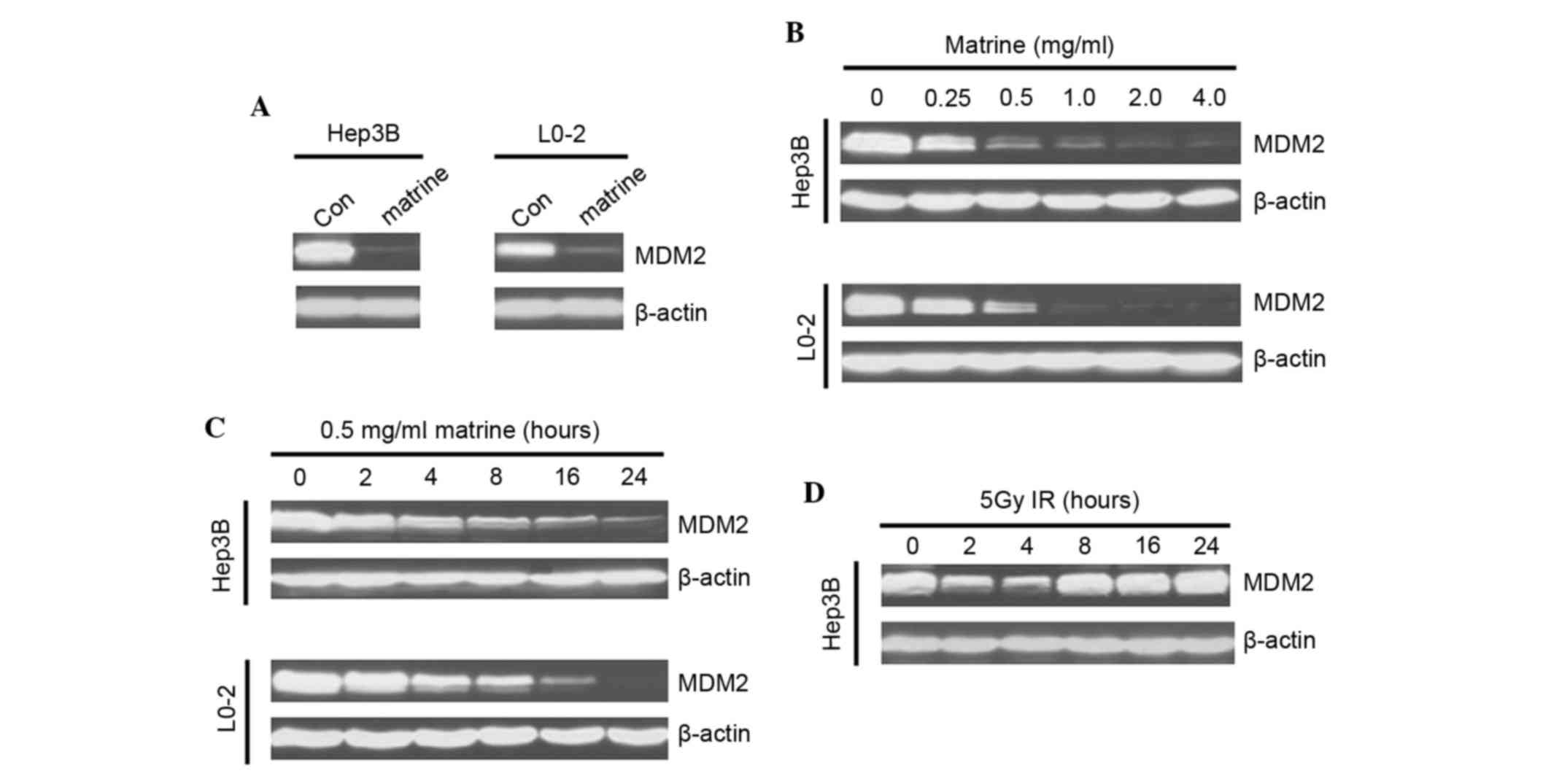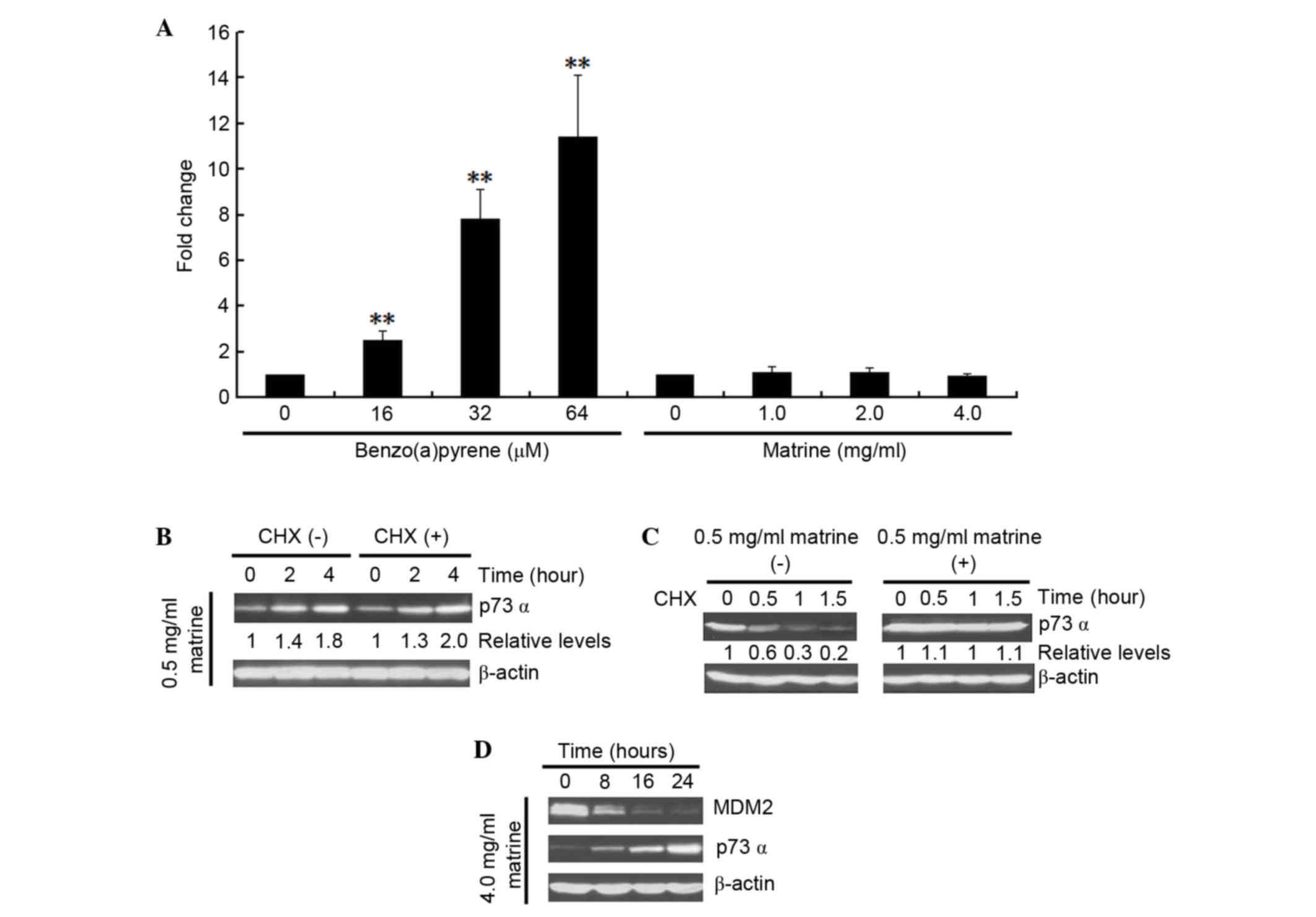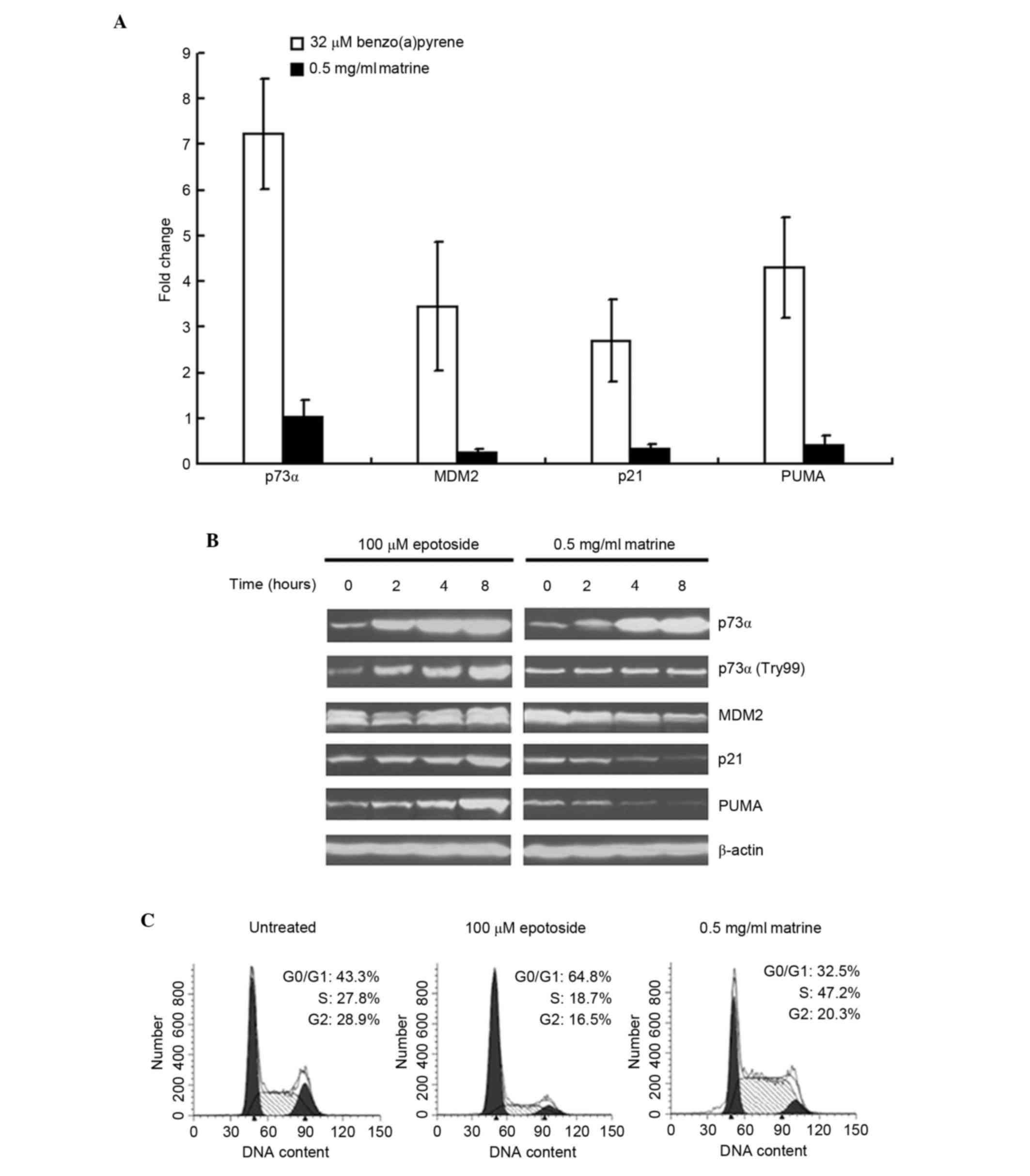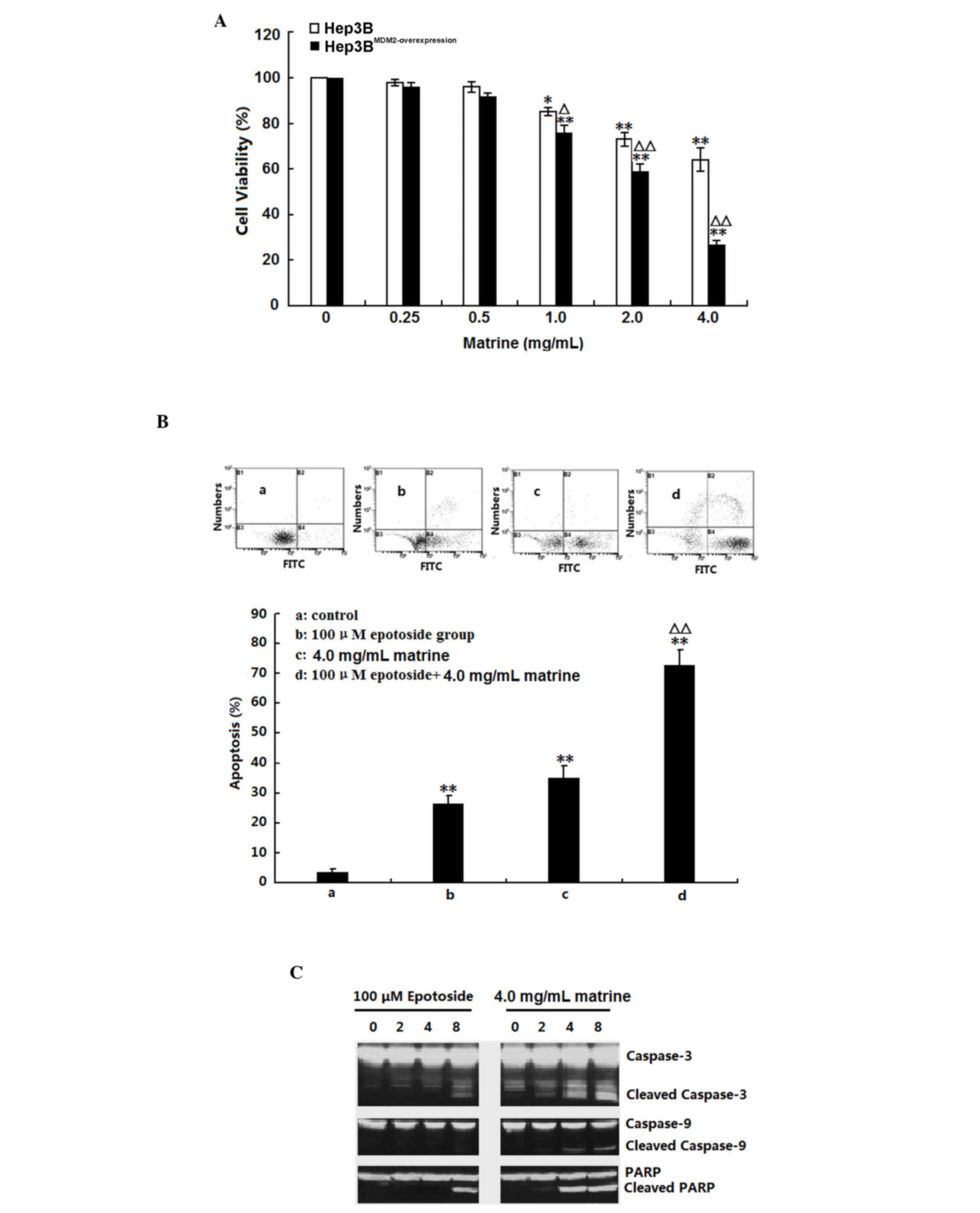|
1
|
Hu ZL, Zhang JP, Qian DH, Lin W, Xie WF,
Zhang XR and Chen WZ: Effects of matrine on mouse splenocyte
proliferation and release of interleukin-1 and −6 from peritoneal
macrophages in vitro. Zhongguo Yao Li Xue Bao. 17:259–261.
1996.PubMed/NCBI
|
|
2
|
Cheng H, Xia B, Zhang L, Zhou F, Zhang YX,
Ye M, Hu ZG, Li J, Li J, Wang ZL, et al: Matrine improves
2,4,6-trinitrobenzene sulfonic acid-induced colitis in mice.
Pharmacol Res. 53:202–208. 2006. View Article : Google Scholar : PubMed/NCBI
|
|
3
|
Liu J, Zhu M, Shi R and Yang M: Radix
Sophorae flavescentis for chronic hepatitis B: A systematic review
of randomized trials. Am J Chin Med. 31:337–354. 2003. View Article : Google Scholar : PubMed/NCBI
|
|
4
|
Tan C, Qian X, Jia R, Wu M and Liang Z:
Matrine induction of reactive oxygen species activates p38 leading
to caspase-dependent cell apoptosis in non-small cell lung cancer
cells. Oncol Rep. 30:2529–2535. 2013.PubMed/NCBI
|
|
5
|
Liu XS, Jiang J, Jiao XY, Wu YE and Lin
JH: Matrine-induced apoptosis in leukemia U937 cells: Involvement
of caspases activation and MAPK-independent pathways. Planta Med.
72:501–506. 2006. View Article : Google Scholar : PubMed/NCBI
|
|
6
|
Jiang H, Hou C, Zhang S, Xie H, Zhou W,
Jin Q, Cheng X, Qian R and Zhang X: Matrine upregulates the cell
cycle protein E2F-1 and triggers apoptosis via the mitochondrial
pathway in K562 cells. Eur J Pharmacol. 559:98–108. 2007.
View Article : Google Scholar : PubMed/NCBI
|
|
7
|
Hu MJ, Zeng H, Wu YL, Zhang YP, Zhang S,
Qiao MM and Fu H: Synergistic effects of matrine and 5-fluorouracil
on tumor growth of the implanted gastric cancer in nude mice. Chin
J Dig Dis. 6:68–71. 2005. View Article : Google Scholar : PubMed/NCBI
|
|
8
|
Zhang JQ, Li YM, Liu T, He WT, Chen YT,
Chen XH, Li X, Zhou WC, Yi JF and Ren ZJ: Antitumor effect of
matrine in human hepatoma G2 cells by inducing apoptosis and
autophagy. World J Gastroenterol. 16:4281–4290. 2010. View Article : Google Scholar : PubMed/NCBI
|
|
9
|
Tanigawa S, Fujii M and Hou DX:
Stabilization of p53 is involved in quercetin-induced cell cycle
arrest and apoptosis in HepG2 cells. Biosci Biotechnol Biochem.
72:797–804. 2008. View Article : Google Scholar : PubMed/NCBI
|
|
10
|
Schavolt KL and Pietenpol JA: p53 and
Delta Np63 alpha differentially bind and regulate target genes
involved in cell cycle arrest, DNA repair and apoptosis. Oncogene.
26:6125–6132. 2007. View Article : Google Scholar : PubMed/NCBI
|
|
11
|
Reinhardt HC, Aslanian AS, Lees JA and
Yaffe MB: p53-deficient cells rely on ATM- and ATR-mediated
checkpoint signaling through the p38MAPK/MK2 pathway for survival
after DNA damage. Cancer Cell. 11:175–189. 2007. View Article : Google Scholar : PubMed/NCBI
|
|
12
|
Michael D and Oren M: The p53 and Mdm2
families in cancer. Curr Opin Genet Dev. 12:53–59. 2002. View Article : Google Scholar : PubMed/NCBI
|
|
13
|
Chène P: Inhibiting the p53-MDM2
interaction: An important target for cancer therapy. Nat Rev
Cancer. 3:102–109. 2003. View
Article : Google Scholar : PubMed/NCBI
|
|
14
|
Shiraishi T and Nielsen PE:
Down-regulation of MDM2 and activation of p53 in human cancer cells
by antisense 9-aminoacridine-PNA (peptide nucleic acid) conjugates.
Nucleic Acids Res. 32:4893–4902. 2004. View Article : Google Scholar : PubMed/NCBI
|
|
15
|
Ongkeko WM, Wang XQ, Siu WY, Lau AW,
Yamashita K, Harris AL, Cox LS and Poon RY: MDM2 and MDMX bind and
stabilize the p53-related protein p73. Curr Biol. 9:829–832. 1999.
View Article : Google Scholar : PubMed/NCBI
|
|
16
|
Dobbelstein M, Wienzek S, König C and Roth
J: Inactivation of the p53-homologue p73 by the mdm2-oncoprotein.
Oncogene. 18:2101–2106. 1999. View Article : Google Scholar : PubMed/NCBI
|
|
17
|
Zeng X, Chen L, Jost CA, Maya R, Keller D,
Wang X, Kaelin WG Jr, Oren M, Chen J and Lu H: MDM2 suppresses p73
function without promoting p73 degradation. Mol Cell Biol.
19:3257–3266. 1999. View Article : Google Scholar : PubMed/NCBI
|
|
18
|
Kowalik TF, DeGregori J, Leone G, Jakoi L
and Nevins JR: E2F1-specific induction of apoptosis and p53
accumulation, which is blocked by Mdm2. Cell Growth Differ.
9:113–118. 1998.PubMed/NCBI
|
|
19
|
Froment P, Dupont J and Christophe-Marine
J: Mdm2 exerts pro-apoptotic activities by antagonizing
insulin-like growth factor-I-mediated survival. Cell Cycle.
7:3098–3103. 2008. View Article : Google Scholar : PubMed/NCBI
|
|
20
|
Pereboom TC, van Weele LJ, Bondt A and
MacInnes AW: A zebrafish model of dyskeratosis congenita reveals
hematopoietic stem cell formation failure resulting from ribosomal
protein-mediated p53 stabilization. Blood. 118:5458–5465. 2011.
View Article : Google Scholar : PubMed/NCBI
|
|
21
|
Huang X, Wu Z, Mei Y and Wu M: XIAP
inhibits autophagy via XIAP-Mdm2-p53 signalling. Embo J.
32:2204–2216. 2013. View Article : Google Scholar : PubMed/NCBI
|
|
22
|
Zheng M, Yang J, Xu X, Sebolt JT, Wang S
and Sun Y: Efficacy of MDM2 inhibitor MI-219 against lung cancer
cells alone or in combination with MDM2 knockdown, a XIAP inhibitor
or etoposide. Anticancer Res. 30:3321–3331. 2010.PubMed/NCBI
|
|
23
|
Deb SP, Singh S and Deb S: MDM2
overexpression, activation of signaling networks, and cell
proliferation. Subcell Biochem. 85:215–234. 2014. View Article : Google Scholar : PubMed/NCBI
|
|
24
|
Jones SN, Hancock AR, Vogel H, Donehower
LA and Bradley A: Overexpression of Mdm2 in mice reveals a
p53-independent role for Mdm2 in tumorigenesis. Proc Natl Acad Sci
USA. 95:15608–15612. 1998. View Article : Google Scholar : PubMed/NCBI
|
|
25
|
Jiang Y, Zhang XY, Sun L, Zhang GL,
Duerksen-Hughes P, Zhu XQ and Yang J: Methyl methanesulfonate
induces apoptosis in p53-deficient H1299 and Hep3B cells through a
caspase 2- and mitochondria-associated pathway. Environ Toxicol
Pharmacol. 34:694–704. 2012. View Article : Google Scholar : PubMed/NCBI
|
|
26
|
Jiang Y, Rao K, Yang G, Chen X, Wang Q,
Liu A, Zheng H and Yuan J: Benzo(a)pyrene induces p73 mRNA
expression and necrosis in human lung adenocarcinoma H1299 cells.
Environ Toxicol. 27:202–210. 2012. View Article : Google Scholar : PubMed/NCBI
|
|
27
|
Yu Q, Li Y, Mu K, Li Z, Meng Q, Wu X, Wang
Y and Li L: Amplification of Mdmx and overexpression of MDM2
contribute to mammary carcinogenesis by substituting for p53
mutations. Diagn Pathol. 9:712014. View Article : Google Scholar : PubMed/NCBI
|
|
28
|
Chow KU, Nowak D, Boehrer S, Ruthardt M,
Knau A, Hoelzer D, Mitrou PS and Weidmann E: Synergistic effects of
chemotherapeutic drugs in lymphoma cells are associated with
down-regulation of inhibitor of apoptosis proteins (IAPs),
prostate-apoptosis-response-gene 4 (Par-4), death-associated
protein (Daxx) and with enforced caspase activation. Biochem
Pharmacol. 66:711–724. 2003. View Article : Google Scholar : PubMed/NCBI
|
|
29
|
Lederman M, Meir T, Zeschnigk M, Pe'er J
and Chowers I: Inhibitor of apoptosis proteins gene expression and
its correlation with prognostic factors in primary and metastatic
uveal melanoma. Curr Eye Res. 33:876–884. 2008. View Article : Google Scholar : PubMed/NCBI
|
|
30
|
Eckelman BP, Salvesen GS and Scott FL:
Human inhibitor of apoptosis proteins: Why XIAP is the black sheep
of the family. EMBO Rep. 7:988–994. 2006. View Article : Google Scholar : PubMed/NCBI
|
|
31
|
Wang R, Li B, Wang X, Lin F, Gao P, Cheng
SY and Zhang HZ: Inhibiting XIAP expression by RNAi to inhibit
proliferation and enhance radiosensitivity in laryngeal cancer cell
line. Auris Nasus Larynx. 36:332–339. 2009. View Article : Google Scholar : PubMed/NCBI
|
|
32
|
Qiao L, Li GH, Dai Y, Wang J, Li Z, Zou B,
Gu Q, Ma J, Pang R, Lan HY and Wong BC: Gene expression profile in
colon cancer cells with respect to XIAP expression status. Int J
Colorectal Dis. 24:245–260. 2009. View Article : Google Scholar : PubMed/NCBI
|
|
33
|
Gu L, Zhu N, Zhang H, Durden DL, Feng Y
and Zhou M: Regulation of XIAP translation and induction by MDM2
following irradiation. Cancer Cell. 15:363–375. 2009. View Article : Google Scholar : PubMed/NCBI
|
|
34
|
Nur-E-Kamal A, Li TK, Zhang A, Qi H, Hars
ES and Liu LF: Single-stranded DNA induces ataxia telangiectasia
mutant (ATM)/p53-dependent DNA damage and apoptotic signals. J Biol
Chem. 278:12475–12481. 2003. View Article : Google Scholar : PubMed/NCBI
|
|
35
|
Sasaki Y, Morimoto I, Ishida S, Yamashita
T, Imai K and Tokino T: Adenovirus-mediated transfer of the p53
family genes, p73 and p51/p63 induces cell cycle arrest and
apoptosis in colorectal cancer cell lines: Potential application to
gene therapy of colorectal cancer. Gene Ther. 8:1401–1408. 2001.
View Article : Google Scholar : PubMed/NCBI
|
|
36
|
Blattner C, Hay T, Meek DW and Lane DP:
Hypophosphorylation of Mdm2 augments p53 stability. Mol Cell Biol.
22:6170–6182. 2002. View Article : Google Scholar : PubMed/NCBI
|
|
37
|
Okamoto K, Li H, Jensen MR, Zhang T, Taya
Y, Thorgeirsson SS and Prives C: Cyclin G recruits PP2A to
dephosphorylate Mdm2. Mol Cell. 9:761–771. 2002. View Article : Google Scholar : PubMed/NCBI
|




















